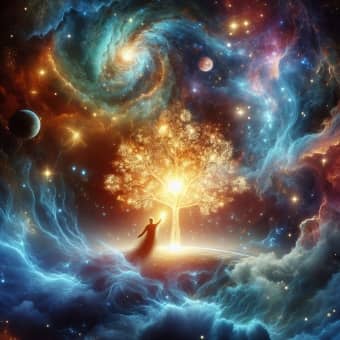Exploring the Fascinating Concept of Eternal Life
The Quest for Immortality
Throughout history, the concept of eternal life has fascinated philosophers, scientists, and theologians alike. It stirs an innate curiosity about the unknown and taps into the universal human desire to transcend death and time.
From the elixirs of immortality in ancient myths to modern scientific breakthroughs in biotechnology, the pursuit of living forever continues to captivate our imagination and drive our research.
This blog post contains affiliate links. When you click on a link on this page and make a purchase I may earn a small commission, at no additional cost to you. Thank you for your support.
Historical Perspectives on Eternal Life
The quest for immortality is not new; it dates back to ancient civilizations across the globe. The Egyptians believed in an afterlife where they could live forever in a perfect state, which led to the practice of mummification to preserve the body after death.
Similarly, the Chinese emperors consumed potions of mercury, believing it would grant them eternal life. These historical examples illustrate the lengths to which humans will go to achieve immortality, driven by a deep-seated fear of death and the unknown.
Religious and Philosophical Underpinnings
Religiously, eternal life often promises a continuation of existence in a spiritual realm. In Christianity, eternal life is the gift of God and is associated with salvation and resurrection. In Hinduism and Buddhism, concepts of reincarnation suggest a perpetual cycle of birth, death, and rebirth until reaching enlightenment or Moksha—freedom from the cycle.
Philosophically, discussions around eternal life often touch on the implications of living forever. Would eternal life rob life of its meaning and urgency? Is death necessary for life to have purpose? These questions challenge our understanding of existence and highlight inherent value conflicts in the pursuit of immortality.

Scientific Endeavors and Ethical Dilemmas
In modern times, science has taken the lead in the pursuit of eternal life. Advances in genetics, biotechnology, and medicine hold promises of extending life expectancy and potentially achieving immortality.
Researchers are exploring the genetic mechanisms behind aging, with studies in creatures like the immortal jellyfish (Turritopsis dohrnii), which can theoretically live forever by continually reverting to its juvenile form.
However, with these advancements, ethical questions emerge. What would be the societal impact of significant life extension? How would our planet cope with the population growth? These considerations remind us that the quest for eternal life is not just a scientific challenge but a profound ethical and philosophical inquiry.
Cultural Impact and the Future of Humanity
The desire for eternal life also deeply affects culture, impacting everything from literature and arts to how societies are structured. The cultural impacts mirror our deepest fears and highest hopes for what it means to be human.
As we move forward, the concept of eternal life continues to evolve with new technologies and theories. It compels us to think critically about the moral aspects of death and immortality. Whether we ever achieve eternal life or not, the journey towards it will undoubtedly help us understand more about ourselves and the fundamental nature of life.
In conclusion, while the pursuit of eternal life raises as many questions as it answers, it continues to be a compelling story of human endeavor. It’s a testament to our relentless quest for knowledge and our unyielding desire for survival beyond the natural boundaries of life.
Whether viewed as a mythical dream or a future reality, the quest for eternal life remains a defining aspect of the human experience.
